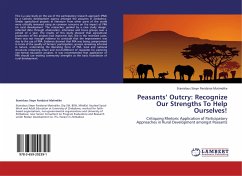This is a case study on the use of the participatory research approach (PRA) by a Catholic development agency amongst the peasants in Zimbabwe. Similar agricultural projects in literature from other parts of the world were critically reviewed using six common concerns on the impact of PRA on rural development. The researcher, guided by a case study design, collected data through observation, interviews and focus groups over a period of a year. The results of this study showed that agricultural production of the projects had improved. But, like in the reviewed cases, there was not enough evidence to conclude that the improvement was due to the use of PRA. Evidence showed that PRA was being compromised in terms of the quality of farmers participation, groups remaining informal in nature, underrating the liberating force of PRA, local and national structures remaining intact and non-fulfillment of requisites for planning non-formal education projects. It was recommended that application of PRA should use existing community strengths as the basic foundation of rural development.
Bitte wählen Sie Ihr Anliegen aus.
Rechnungen
Retourenschein anfordern
Bestellstatus
Storno








